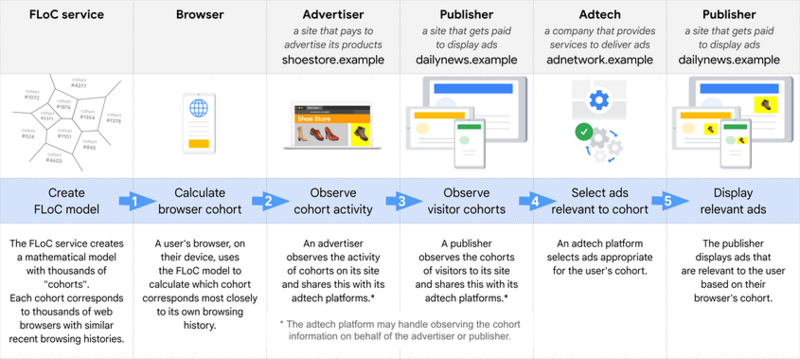Google Chrome, the world's most popular browser, is ditching cookies. The company is now moving towards FLoC technology. This is a huge change as cookies have been around since 1994, since the olden days of Netscape.
In 2020, the company made a bombshell announcement, stating that support for "third-party" cookies would be phased out in the next two years.
But, instead of doing away with tracking completely, the company aims to use new proprietary technology known as the Federated Learning of Cohorts, or FLoC. They have been testing it for quite some time too. Here are five things you need to know about Google's upcoming FLoC technology.
1. When Does It Launch?
The FLoC technology is expected to launch sometime in 2023. The plan was to launch it earlier, as most browsers already block third-party internet cookies. Google's playing catch-up, but the company isn't concerned.
The plan was actually to launch FLoC much earlier, but the company soon realized that the infrastructure wasn't in place as yet. Completely removing tracking altogether was never an option for a company like Google, and such a major move requires careful planning. Thus, the company delayed their original launch plans to 2023.
The company has broken down the launch into two stages.
- Public Development and Testing Stage: this will last nine months. The company calls it the public development and testing period, allowing users to give FLoC a try.
- Phasing Out Support for Third-Party Cookies: starting in 2023, the company will phase out support for third-party cookies in a span of three months.
A more comprehensive schedule will be available via Google's Privacy Sandbox in the future.
2. FLoC's Impact on Privacy
The company wants to completely change the way users are tracked online. However, the impact on privacy and user security is likely to be significant.
The Federated Learning of Cohorts is a mechanism that allows advertisers to send targeted ads to "groups" of users that share similar interests. The company uses algorithms to assign users to different "cohorts," or groups.
Instead of outlining individuals and their interests, FLoC will simply hide them among large crowds. While the company feels that FLoC will be a step forward from invasive cookies, many disagree.
A FLoC ID will still be used, and this ID will reveal your private browsing history to advertisers and publishers. Even though FLoC will group users together, adtech companies can still create "user fingerprints."
Companies can use sophisticated machine learning algorithms to identify individuals from larger samples - and Google acknowledges that.
FLoC data could reveal more information about users if it is used in tandem with other information, such as sign-in data. This could essentially reveal a person's identity to advertisers.
Chrome 89 already included an option to test FLoC, and the company is pushing ahead with the public testing stage.
3. How Is FLoC Different From Cookies?
Internet cookies have been around for quite a while. Almost every other website you visit will give you a prompt, asking you to accept their use of cookies.
Simply put, a cookie is a small text file that's downloaded and stored on your computer by that website. This little text file monitors your activity on the website, and this information is sent back for analysis whenever you visit the site.
This may seem like a gross invasion of your privacy, but it's not as bad as it seems. Many websites use ads to generate revenue. They use tracking cookies (also known as third-party cookies) to send targeted ads to your site based on your interests.
Such cookies keep a list of websites you frequent and track the pages you check often. By using this information and combining it with your IP address, they identify your geolocation. Marketers can use this specific information to send targeted ads for products or events in your area.
Many browsers, including Mozilla, Brave, Safari, Chrome, and even Microsoft Edge, give you the option to disable tracking cookies.
FLoC is different than cookies in several ways. Instead of using individual cookies to track data, this mechanism would assign browsers to larger cohorts with similar browsing preferences. In essence, your "individual" browsing history won't be shared.
Publishers that usually track browsing data of individuals won't be able to view history stored in a cohort. It's never shared, not even with Google. Instead, publishers can send targeted ads to cohorts with similar interests.
This is the company's attempt at creating a more privacy-focused environment for users. There are steps that you can take to reduce targeted ads on social media, but most websites generally make it difficult to turn off third-party cookies.
4. Why the Change?
A number of browsers previously banned third-party tracking altogether. Google never did so, because their entire business model relies on ads.
However, as privacy becomes more and more of a problem and organizations continue to highlight their concerns, the company was compelled to make a move. Instead of banning third-party cookies altogether, they designed a whole new model.
Given the popularity of Chrome, it's likely that FLoC will be adopted across the entire industry. The company is also trying to change the narrative - as many consider Google to regularly breach user privacy - by addressing user concerns with FLoC.
5. How Has the Community Reacted to the Announcement?
The reaction to Google's announcement has not been kind. When Google first announced its privacy-first mechanism to replace cookies, several big names including the Electronic Frontier Foundation (EFF), Brave, Vivaldi, Mozilla, and DuckDuckGo all spoke out against it.
An antitrust investigation was also launched by the EU soon after, forcing Google to delay the launch. Many believe that the change will still expose user data, especially with adtech platforms getting more intuitive by the day.
The EFF and other organizations believe that the best way forward is to eliminate the use of targeting cookies completely. Suffice to say, the big players are not happy, but that hasn't deterred the social media giant.
What to Expect in the Future
Google has been adamant that FLoC is the best replacement for third-party cookies. Many people already block third-party cookies by default, so companies like Google and Facebook are looking to move to a new model.
Google has been known for its invasive tracking, and the company is trying to change user perception by introducing a series of new privacy-focused features in its latest Chrome updates.



